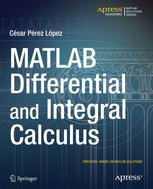

Most ebook files are in PDF format, so you can easily read them using various software such as Foxit Reader or directly on the Google Chrome browser.
Some ebook files are released by publishers in other formats such as .awz, .mobi, .epub, .fb2, etc. You may need to install specific software to read these formats on mobile/PC, such as Calibre.
Please read the tutorial at this link: https://ebookbell.com/faq
We offer FREE conversion to the popular formats you request; however, this may take some time. Therefore, right after payment, please email us, and we will try to provide the service as quickly as possible.
For some exceptional file formats or broken links (if any), please refrain from opening any disputes. Instead, email us first, and we will try to assist within a maximum of 6 hours.
EbookBell Team

0.0
0 reviewsMATLAB is a high-level language and environment for numerical computation, visualization, and programming. Using MATLAB, you can analyze data, develop algorithms, and create models and applications. The language, tools, and built-in math functions enable you to explore multiple approaches and reach a solution faster than with spreadsheets or traditional programming languages, such as C/C++ or Java.
MATLAB Differential and Integral Calculus introduces you to the MATLAB language with practical hands-on instructions and results, allowing you to quickly achieve your goals. In addition to giving a short introduction to the MATLAB environment and MATLAB programming, this book provides all the material needed to work with ease in differential and integral calculus in one and several variables. Among other core topics of calculus, you will use MATLAB to investigate convergence, find limits of sequences and series and, for the purpose of exploring continuity, limits of functions. Various kinds of local approximations of functions are introduced, including Taylor and Laurent series. Symbolic and numerical techniques of differentiation and integration are covered with numerous examples, including applications to finding maxima and minima, areas, arc lengths, surface areas and volumes. You will also see how MATLAB can be used to solve problems in vector calculus and how to solve differential and difference equations.